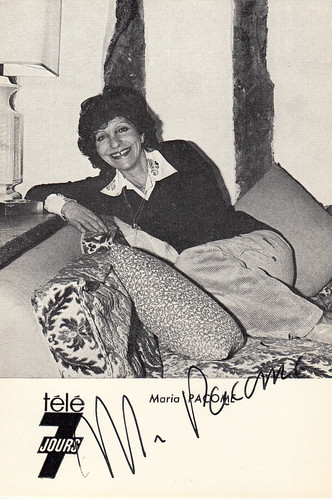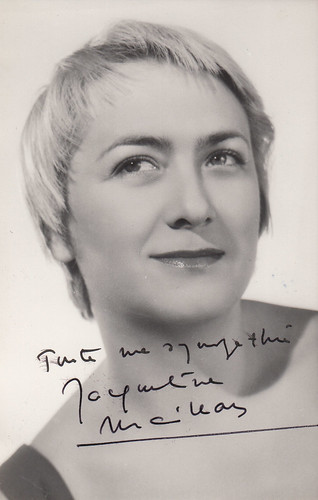Speaking of Boulevard theatre, the importance of the French TV show 'Au théâtre ce soir' has to be mentioned. This very successful program consisted of a play filmed in live conditions, usually at the famous Théâtre Marigny. From 1966 to 1985, more than 400 plays were broadcast. 'Au théâtre ce soir' gave French TV viewers the opportunity to spend an evening in Paris without moving from their homes. They could enjoy popular plays and see well-known stage players in action. The crème de la crème of the Boulevard theatre, including of course Desmarets, Maillan, Mercadier and Pacôme, appeared in 'Au théâtre ce soir' and delighted the audience.
The film careers of these four actresses have been somewhat overshadowed by their stage successes. Sophie Desmarets’ filmography is the most prolific but you won’t find any great classic or cult movie in it. The same can be said of Mercadier’s films. In this respect, Jacqueline Maillan had more luck as Pouic-Pouic (1964) and Papy fait de la résistance (1983) have become stalwarts of French film comedy. Maria Pacôme also did rather well as Les sous-doués, which benefited from director Claude Zidi’s expertise, came fourth at the French box office in 1980.
Marthe Mercadier (1928-2021)

French postcard by Editions du Globe, Paris, no. 193. Photo: Sam Lévin. Collection: Marlene Pilaete.
Marthe Mercadier was born in Saint-Ouen, France, in 1928. She made her stage debut in 1945 and appeared in her first film in 1950.
She was one of the big names of the Boulevard Theatre and was very popular in comedies such as 'Charmante soirée' (1955), 'Chérie noir' (1958),'Coralie et Cie' (1961), 'Les filles' (1965), 'Interdit au public' (1967), 'Ah ! La police de papa' (1972), 'La libellule' (1975), 'Diable d’homme!' » (1980), 'Les voisins du dessus' (1985), 'La bonne Anna' (1991), 'La poule aux œufs d’or' (1995), 'Le squat'. (2000), 'Tout bascule' (2005), etc.
On television, she starred nine times in the successful show Au théâtre ce soir from 1966 to 1980. She also played in several episodes of the iconic series Les Saintes Chéries from 1965 to 1971 and was a contestant in the French version of Dance With the Stars in 2011.
Until the beginning of the 1970s, she worked quite regularly for the film industry and was often used for her comic skills. Her films include Jamais deux sans trois (1951), Capitaine Pantoufle (1953), Casse-cou, mademoiselle! (1955), Vacances explosives! (1957), Le tombeur (1958), Dans l’eau … qui fait des bulles! (1961), Les enquiquineurs (1966), Aux frais de la princesse (1966), La coqueluche (1971), etc.
Among her rare later appearances, we can mention Te marre pas … c’est pour rire! (1982), again an unassuming comedy that didn’t leave a mark on film history. She also was a co-producer of Et la tendresse? Bordel!, which ranked fourth place in the 1979 French box office.
Unfortunately, Alzheimer's disease forced her to retire in the mid-2010s.
Sophie Desmarets (1922-2012)

German postcard by Universum-Film Aktiengesellschaft (Ufa/Film-Foto), Berlin-Tempelhof, no. 3092. Photo: P. A.-C., Paris. Collection: Marlene Pilaete.
Sophie Desmarets was born in Paris in 1922 and had her first stage success in 1945 with 'Le soldat et la sorcière'. She was a major figure of the French Boulevard theatre in the second half of the Twentieth Century. Her two signature plays, 'Fleur de cactus' (1964) and 'Peau de vache' (1975), have been especially written for her by famous playwrights Pierre Barillet and Jean-Pierre Grédy. Her other creations include 'Une femme libre' (1949), 'Hélène ou la joie vivre' (1952), 'Adieu prudence' (1961), 'L’arc de triomphe' (1973), etc.
Her screen career started in 1940 and took off in the mid-1940s. For about 25 years, she was a popular film star and was featured in such films as Seul dans la nuit (1945), Le Capitan (1946), 120, rue de la gare (1946), Rocambole (1947), Tierce à coeur (1947), Femme sans passé (1948), Vire-vent (1949), Le roi (1949), Mon ami Sainfoin (1950), Ma pomme (1950), Ma femme est formidable (1951), Mon mari est merveilleux (1952), Une femme épatante (1955), Ces sacrées vacances (1956), Miss catastrophe (1957), Madame et son auto (1958), Drôles de phénomènes (1959), La famille Fenouillard (1961), La tête du client (1965), Toutes folles de lui (1967), etc.
She also had the opportunity to work opposite several famous Italian stars: Aldo Fabrizi in Signori, in carrozza! (1951), Raf Vallone in Le secret de Soeur Angèle (1956), Renato Rascel in Anonima cocottes (1960), Ugo Tognazzi in La ragazza di mille mesi (1961) and Walter Chiari in Le motorizzate (1963). After having played the role of Bourvil’s sister in Le mur de l’Atlantique (1970), she appeared in only a handful of films, among them Le maestro (1977), Les mamies (1992) and Fallait pas! (1996).
On TV, she starred twice in Au théâtre ce soir in 1972 and 1980 and was a regular guest in the comedy show Les grands enfants (1966-1970). She was also the heroine of the series Toutes griffes dehors in 1982.
Maria Pacôme (1923-2018)

French card, published by Télé 7 jours, a TV magazine founded in 1960. Télé 7 jours was hugely popular and quickly reached one of the highest circulation figures of the French press. It still exists today. Collection: Marlene Pilaete.
Maria Pacôme was born in Paris in 1923. After her divorce from Maurice Ronet in 1956, she decided to embark on a stage career. She soon became one of the best-loved comediennes of the French Boulevard theatre. She starred in, for example, 'Le signe de Kikota' (1960), 'N’écoutez pas mesdames' (1962), 'Léon ou la bonne formule' (1963), 'Quand épousez-vous ma femme?' (1964), 'Les grosses têtes' (1969), 'Le noir te va si bien' (1975), 'Joyeuses Pâques' (1980), 'Pâquerette' (1989), 'Une mesure d’avance' (1997), etc.
She also appeared in several self-written plays : 'Apprends-moi Céline' (1977), 'Le jardin d’Eponine' (1981), 'On m’appelle Emilie' (1984), 'Les seins de Lola' (1987), 'Et moi et moi' (1990), 'Les désarrois de Gilda Rumeur' (1993) and 'L’éloge de ma paresse' (2002).
She made her screen debut in 1959 but she never achieved in the cinema the same success she had on stage. Her two most famous roles were as a school principal in Les sous-doués (1980) and as an unconventional mother in La crise (1992), which earned her a César nomination in the best supporting actress category in 1993. Her other comedies include Le distrait (1970), Bons baisers … à lundi (1974), Pas de problème (1975), La situation est grave mais … pas désespérée (1976), etc.
Although film directors usually used her for her sense of comic timing, she, however, showed other facets of her talent in Le dernier baiser (1977) and Le bel été 1914 (1996), which was adapted from a Louis Aragon novel. On television, she notably appeared seven times in Au théâtre ce soir from 1966 to 1977 and she played a doctor’s assistant in the popular series Docteur Sylvestre from 1995 to 1999.
Jacqueline Maillan (1923-1992)

French autographed card. Photo: Nogrady, 18 Rue Pigalle, Paris 9e. Collection: Marlene Pilaete.
Jacqueline Maillan was born in Paray-Le-Monial, France, in 1923. She began to be noticed in 1952 when she worked at the Parisian cabaret L’Amiral alongside other jolly fellows such as Jean Richard, Roger-Pierre, and Jean-Marc Thibault. She then was featured in several successful comedies: 'Ah les belles bacchantes' (1953), 'Ornifle' (1955), 'Gog et Magog' (1959) and 'Sacré Léonard' (1963).
In 1956, she recorded an EP called 'Chansons d’humour', written by her husband, Michel Emer, and sang at the famous Olympia Hall in 1957. In 1958, Bruno Coquatrix, Olympia’s manager, signed her again for the show 'Le curieux destin de Madame X', again written by Emer.
She became a huge stage star thanks to 'Croque-monsieur' (1964). AfterwardS, she starred in, for example, 'La facture' (1968), 'Folle Amanda' (1971), 'Féfé de Broadway' (1977), 'Potiche' (1980), 'Lily et Lily' (1985), or 'Pièce montée' (1991). Her comedy skills and bursting energy made her loved by a faithful public, for which she became one of the undisputed queens of the Boulevard Theatre.
After having appeared in three shorts from 1947 to 1950, her film career really started in 1954 but could never match her theatre fame. Her two most famous roles on the screen were as Louis de Funès’ wife in Pouic-Pouic (1964) and as an opera singer in Papy fait de la résistance (1983). Her friend Pierre Mondy offered her the title role of Appelez-moi Mathilde (1969) and iconoclastic director Jean-Pierre Mocky, who appreciated her very much, directed her in Y a-t-il un Français dans la salle (1982), Les saisons du plaisir (1988), Une nuit à l’Assemblée Nationale (1988) and Ville à vendre (1992).
Her other films include Vous n’avez rien à déclarer (1959), Les héritiers (1959), Les veinards (1962), Comment trouvez-vous ma soeur (1963), La bonne occase (1964), Monsieur le Président Directeur Général (1966), La vie dissolue de Gérard Floque (1986), A notre regrettable époux (1988), etc.
On television, she was a regular guest in the comedy show Les grands enfants from 1968 to 1970 and she appeared three times in Au théâtre ce soir from 1974 to 1976. She also joined the cast of the cult series Palace (1988-1989).
Text and postcards: Marlene Pilaete.
No comments:
Post a Comment